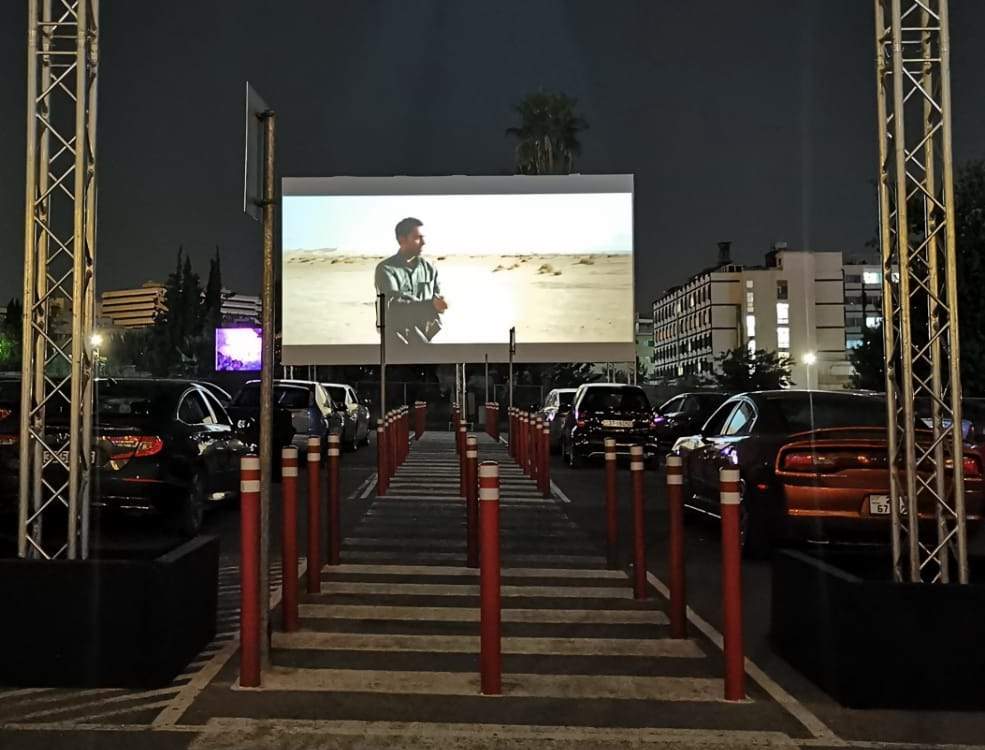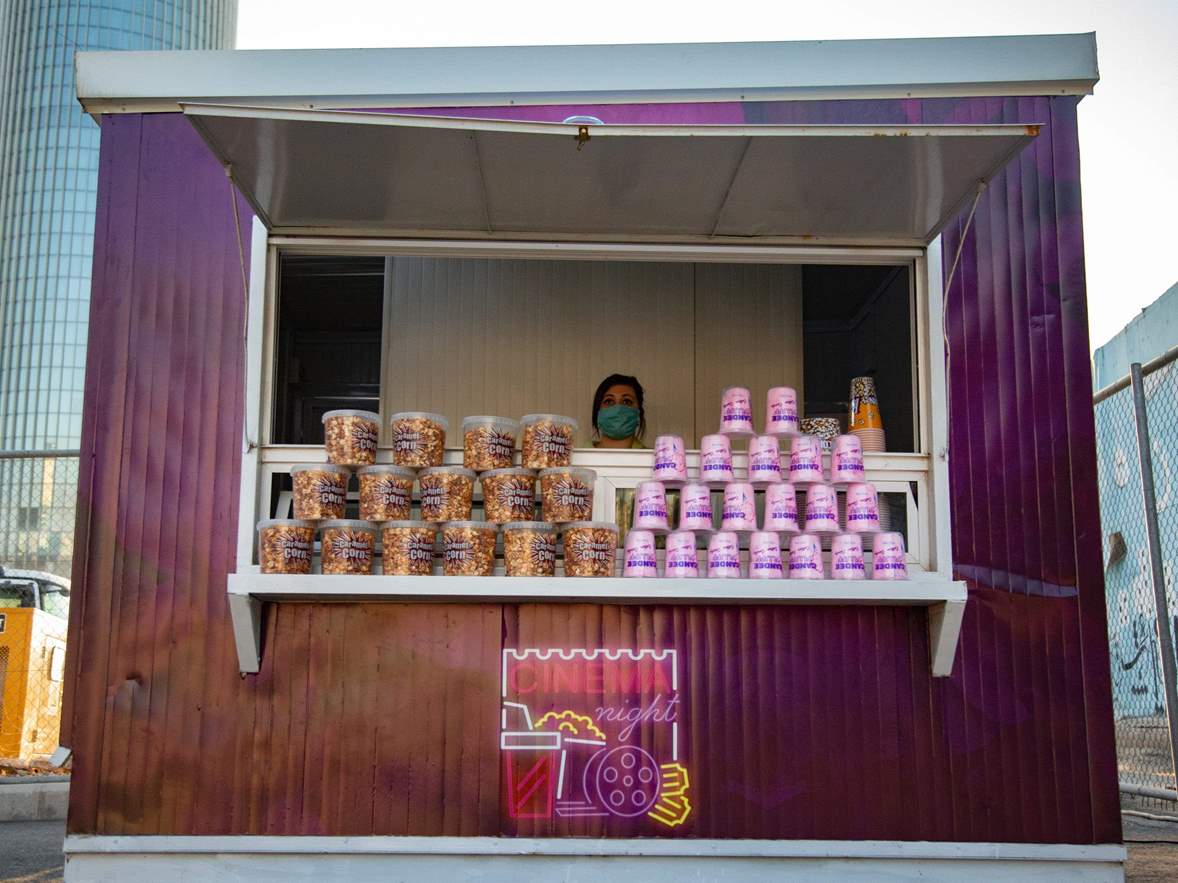AMMAN — When
Amman’s streets emptied suddenly in March 2020, the
Amman International Film Festival (AIFF) was a month away from its debut. Like every store front in the
city, the first
Jordanian film festival was shuttered suddenly and
indefinitely.
اضافة اعلان
Curfew was
established. Masks became as important as house keys and wallets. Bedrooms
became offices, corner stores had lines that twisted around corners. Arguably,
too many people baked bread. It wasn’t long ago, so no need for the refresher.
The festival’s
staff left the office and opened their laptops. Through the combination of a
couple of month's remote work and desperation, a novel concept was finally
established and announced in July.
Amman
introduced a drive-in theater for the first time in Jordan, making the AIFF the
first in-person film festival since the beginning of
COVID-19’s global spread
and the lockdowns that followed swiftly. It proved to be an innovation that
came to define 2020 film festivals globally.
 The AIFF team stands outside the official festival office in
Abdali in this undated photo. (Photo: Aaron Weintraub/JNews)
The AIFF team stands outside the official festival office in
Abdali in this undated photo. (Photo: Aaron Weintraub/JNews)
“Until the last
moment, we all thought it wouldn’t happen here,” said AIFF Director Nada
Doumani. “I think it was, as they (say) in French, a tour de force to
make it happen ... But I think we did well doing it, I think it was a very good
exercise. It also showed to what extent we could be flexible and adapt to
circumstances.”
 The 2020 edition of the Amman International Film Festival is
pictured in these undated photos. The pandemic forced the festival to think
outside the box and incorporate drive-thru screenings for the first time.
(Photo: Handout from the AIFF)
The 2020 edition of the Amman International Film Festival is
pictured in these undated photos. The pandemic forced the festival to think
outside the box and incorporate drive-thru screenings for the first time.
(Photo: Handout from the AIFF)
The
festival will return for its second year on August 23. Along with the drive-in
theaters, Taj Mall has also agreed to screen films from the festival’s
still-unannounced slate of roughly 50 international, Arab, and Jordanian films.
The
festival will also be bringing back a panel of three international jurors to
award Best Arab Feature, as well as Best Feature-length Documentary and Best
Arab Short. There will additionally be a fourth category for International
Features that will be judged and voted on by the festival’s audience. The
drive-in theater will remain in place this year as well.
“It was very
popular,” said Doumani “I think people were sometimes coming just because of
the experience of the drive-in. But, for me, a festival is mainly about
theaters and so this year we’re going have also TAJ Cinema and we’re going to
have the open-air theater at the Royal Film Commission, which we used already
last year. So the same movie will be showcased twice: once in the normal
theater, and once either (at the) open-air or at the drive-in.”
“I think the
biggest difference this year is that we’re going to have guests, every film
will have a filmmaker attached to it. We will have a discussion after the
screening. ... we’re going to have film professionals coming because we’re
having panels, discussions, talks. And the (Abdali Boulevard) will have a
Filmmaker’s Hub, where people can network, mingle, discuss, and move ahead.”
Jordan, like
the rest of the world, has seen a crisis with economic and health concerns
interwoven in unique, complicated ways unforeseen in the country’s history.
HRH Princess
Rym Ali, who serves as President of the AIFF, believes the deeper struggles in
the country shouldn’t negate the promise of the festival’s cultural and
economic potential. Jordan has become a growing presence in the regions film
scene. “The film festival is one outcome of years
of investment in developing a culture of cinema in Jordan,” she said.
“There
is still a long way to go, but the benefits are now beginning to be seen, as
more and more young people are telling their stories and us, as Arabs, increasingly
own our narratives.”
Due
to the spread of the Delta variant, there has been renewed concern in Jordan
and internationally regarding socializing.
An
event that includes international guests and indoor theater screenings would
certainly be in jeopardy if the current trajectory of cases were to continue in
the coming weeks. Doumani said that the festival is treading with extreme
caution.
“For
the time being, theaters are open, as you know, at 50 percent capacity at least
until the first of September. Honestly, we trust whatever the government, and the
(National Center for Security and Crisis Management) say. In any case, if
unfortunately for some reason, the situation gets worse, we’ll take that into
consideration.”
Along
with mandatory spaced seating, proper sanitation stations will be available,
and temperatures will be taken at the entrance of the theaters.
“I hope of
course that the situation will allow for a safe, in person, second edition of
the AIFF. It is important that Jordan be able to welcome international guests,
including jurors and film professionals this year so first-time Arab film
makers can showcase their work to our Jordanian public as well as to the world,”
Princess Rym noted. There are economic impacts that events like the festival
can provide down the road.
“And
of course, a festival can only help to promote tourism in our country. This
year in particular, we are hoping it will also send the message that, after a
year and a half of hardship, Jordan is open to the world and ready for
business.”
Doumani
is also hoping that the expansions of the film festival this year provide an
even greater focus on showcasing developing Arab and Jordanian filmmakers.
“I
think we have ambitions, and rightly so, to be a festival with an edge, with a
niche of its own. We’re focusing on (first-time filmmakers), but not only,” she
said. “And I hope that in five years, not even five, even this year it will be
professional, useful, seamless and entertaining.”
For
Princess Rym, the AIFF shouldn’t be happening despite the continuing pandemic,
but because of it. For its organizers, the festival serves as a reinvestment in
an exhausted city’s identity.
“The
pandemic also made us realize the important role that culture plays in our
everyday life: we all read, listened to music, watched shows or films or
concerts,” she said. “In a way art has never been so punished by circumstances
and at the same time so obviously necessary.”
Read more Lifestyle






